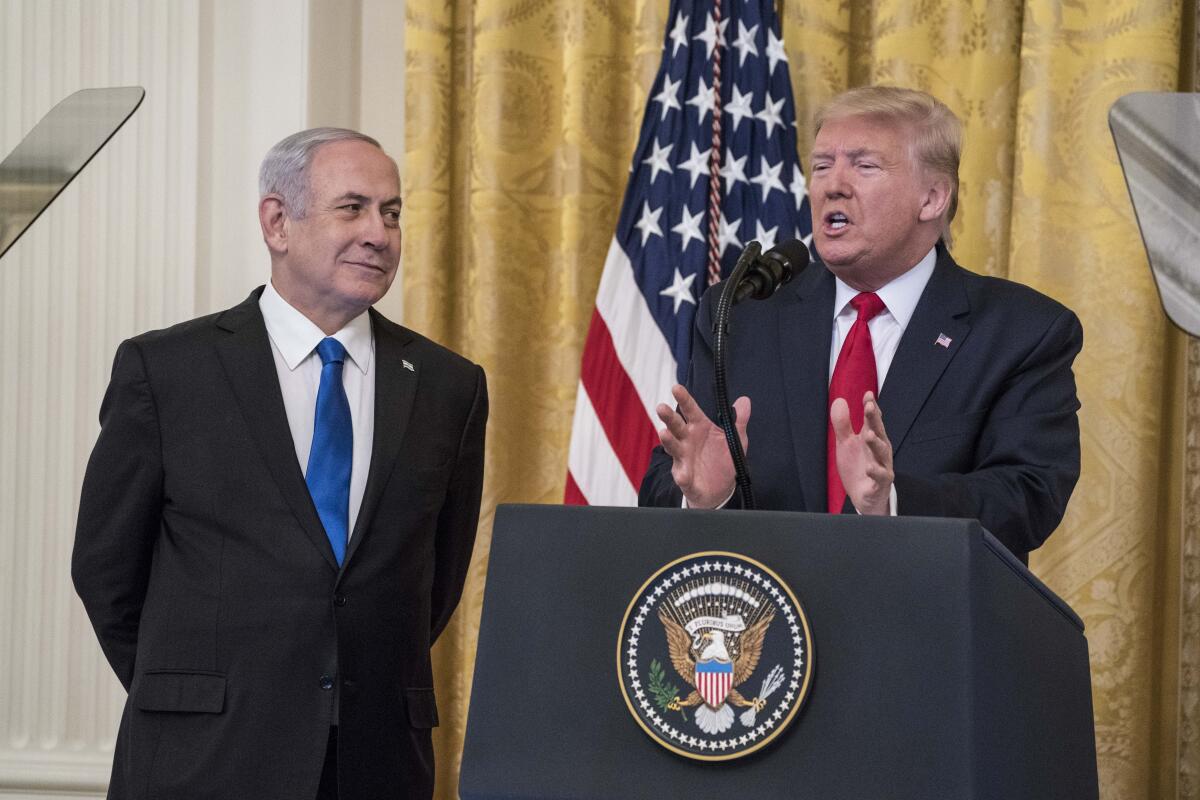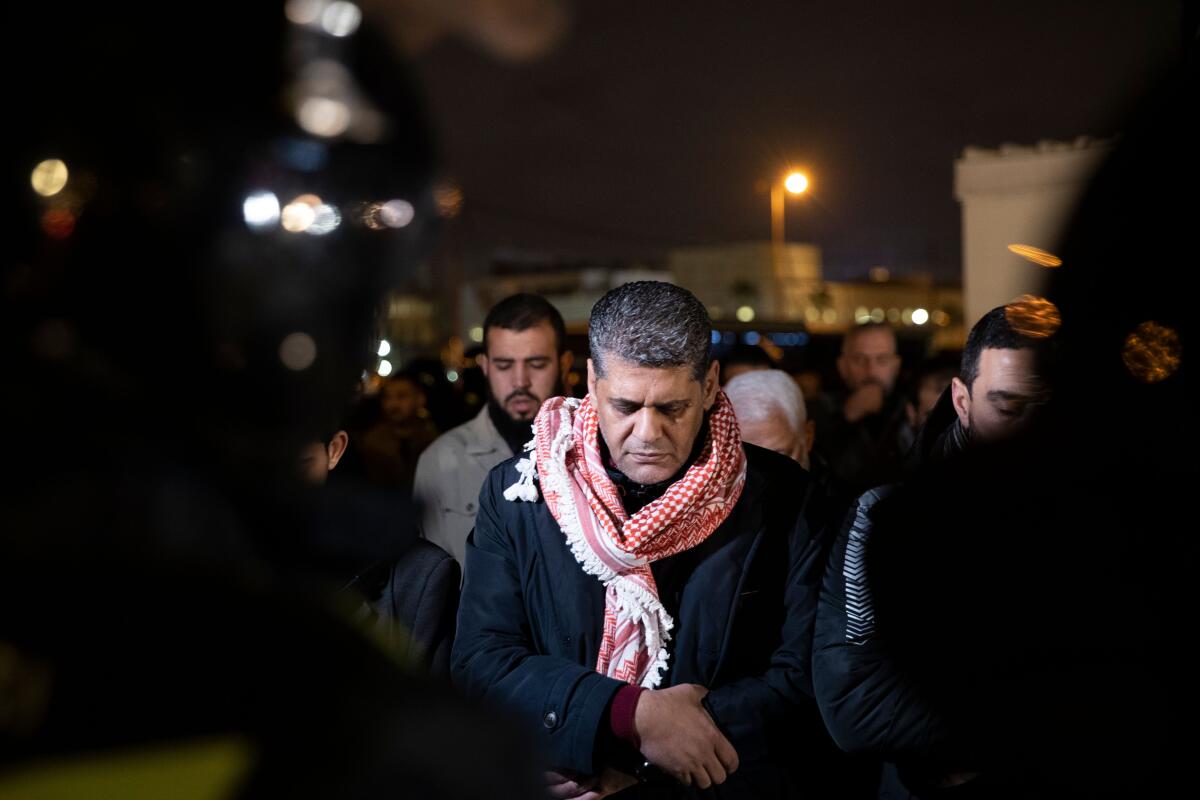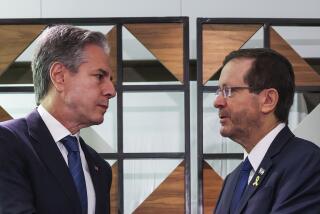Arab states walk careful line on Trump’s peace plan, praising effort but withholding endorsement

AMMAN, Jordan — Not so long ago, the cause of Palestinian statehood was a rallying cry across the Arab world.
That ardor has cooled in recent years. But the muted response in the region to the Trump administration’s much-vaunted Mideast plan suggests that while Arab allies of the U.S. are reluctant to publicly cross the U.S. president, they are also largely unwilling to overtly support his broad aims.
Arab countries have also been preoccupied with the region’s other compelling narratives. In the tumultuous years since the Arab Spring uprisings that began in 2011, many Mideast states have been consumed with their own domestic issues, with focus drifting away from the Palestinian cause. And among predominantly Sunni Arab states, attention has centered on Shiite-dominated Iran as the region’s main menace — a view shared by Israeli Prime Minister Benjamin Netanyahu.
Trump unveiled the proposal on Tuesday at the White House with Netanyahu at his side, but with no Palestinian representative in attendance. The Palestinians played no part in crafting the proposal, having cut off contact more than two years ago, after Trump moved the U.S. Embassy to Jerusalem and imposed punitive measures including the slashing of aid to Palestinians.
“What was missing from what we heard yesterday is peace, and the possibility of peace,” senior Palestinian diplomat Saeb Erekat said Wednesday. “They want to annex the Jordan Valley, the settlements, control our airspace, our water, our land passages, our Jerusalem, they want responsibility for the security west of the Jordan [River] and they impose six conditions on us and tell us we can call ourselves the Sultanate of Palestine? This is shameful.”
Three Arab ambassadors — from Oman, Bahrain and the United Arab Emirates — attended the White House event. But even those governments withheld a formal endorsement of the U.S. proposal, which takes Israel’s side in most issues regarding its dealings with the Palestinians.
Trump spoke enthusiastically of Arab governments playing a positive role in implementing the Mideast plan, assuring Netanyahu of “tremendous support from your neighbors.” But Egypt and Jordan, the only two Arab countries to have signed peace treaties with Israel, were studiously unforthcoming in their responses.
Egypt was careful to voice appreciation for the Trump administration’s efforts, but urged the resumption of talks leading to Palestinians’ “legitimate rights through the establishment of a sovereign independent state.”
Trump’s son-in-law, Jared Kushner, was a major architect of the proposal, under which Israel would retain existing Jewish settlements that honeycomb the West Bank, and the resulting territorial archipelago allotted to the Palestinians would be surrounded by Israel. Palestinians dismissed the plan as offering no chance to create a viable modern state.
The plan calls for Israel to retain control of an “undivided” Jerusalem as its capital, while the Palestinians, who want East Jerusalem as the capital of their future state, are instead being offered a capital in dusty eastern suburbs of Jerusalem that are divided by a barrier wall from the city proper.

Jordan’s King Abdullah II is left in a particularly tricky position, because the Hashemite monarch is officially the guardian of Islam’s third-holiest site, Al Aqsa Mosque in Jerusalem’s Old City. The plan would maintain the status quo at the hilltop plateau, which is also revered by Jews as the Temple Mount, with Muslims permitted to visit and worship.
Rather than following as a rough guideline the borders that existed before Israel seized the West Bank from Jordan in 1967 — as previous U.S.-supported plans envisioned — the administration’s proposal offers the Palestinians about 70% of the West Bank.
Jordan, which has a large Palestinian population, reaffirmed its backing for a Palestinian state based roughly on the 1967 borders, which Foreign Minister Ayman Safadi called “the only path to a comprehensive and lasting peace.” At the same time, the Jordanian foreign minister warned of the “dangerous consequences” of unilateral Israeli measures, such as annexations or settlement expansion.
With the administration’s plan to be taken up in coming days by the Arab League, analysts predicted that most Arab governments would stay a course of voicing mild support for the U.S. effort, but not the substance of the proposal.
“They have decided, ‘We don’t want to fight with Trump,’” said Nimrod Novik, a fellow at the New York-based Israel Policy Forum and a former advisor to the late Shimon Peres, who had served as both Israeli prime minister and president. “So they’re saying, ‘A good start, let’s talk.’”
That assessment was in line with reaction from wealthy Persian Gulf states, which in the past wielded an oil embargo to punish U.S. and Israeli moves against the Palestinians. Trump now counts them as close U.S. allies.
On Wednesday, Saudi Arabia — joined by the United Arab Emirates, Bahrain, Qatar and Oman — expressed support for U.S. “efforts” while framing the plan as a “starting point” for negotiations. Yousef Otaiba, the Emirates’ ambassador to Washington, tweeted that the plan represented “a serious initiative that addresses many issues raised over the years.”
Among Arab governments, there has been long-standing exasperation with Palestinian leaders, who have been accused of incompetence and corruption. And there is greater willingness to engage with Israel while stopping short of normalizing ties.
Saudi Arabia and Abu Dhabi have invited Israeli athletes to participate in sporting events or hosted trade delegations, and Israel recently allowed its citizens to visit Saudi Arabia. Those same governments have put pressure on Palestinian Authority President Mahmoud Abbas as well.
U.S. Secretary of State Michael R. Pompeo, speaking to reporters en route to London, brushed off Palestinian objections, saying the administration is “truly confident that this is a plan that is good for everyone, every Israeli and every Palestinian.”
“They are free to come up with a counteroffer,” he said.
Bulos reported from Amman and King from Washington. Times staff writer Tracy Wilkinson in Washington and special correspondent Noga Tarnopolsky in Jerusalem contributed to this report.
More to Read
Sign up for Essential California
The most important California stories and recommendations in your inbox every morning.
You may occasionally receive promotional content from the Los Angeles Times.











